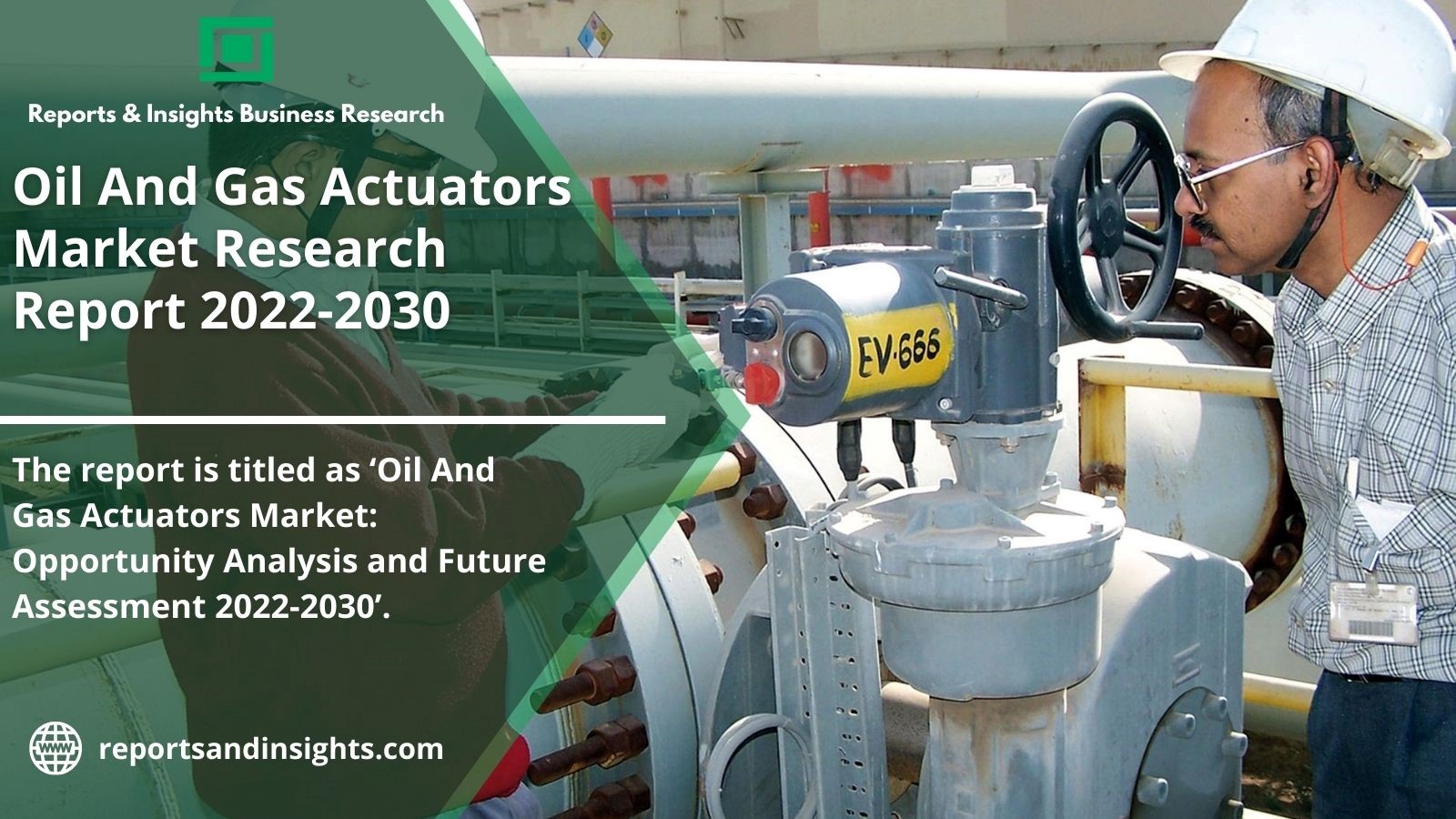Business
Global Oil & Gas Actuators Market to Reach US$ 9,076.2 Million by 2030: Growth, Size, Share and Future Industry Trends | Research by R&I…

The Oil & Gas Actuators Market is estimated to reach at a value of US$ 5,941.4 Mn by the end of 2022 and expected to reach at a value of US$ 9,076.2 Mn by 2030 with a significant CAGR of 5.4%
The oil & gas actuators market is estimated to reach at a value of US$ 5,941.4 Mn by the end of 2022 and expected to reach at a value of US$ 9,076.2 Mn by 2030 with a significant CAGR of 5.4%
Request To Download Sample of Oil & Gas Actuators Market Report:
An operator, or technician, must be present to modify manually-operated valves, which are adjusted using a direct or geared mechanism attached to the valve stem. Power-operated actuators, on the other hand, use gas, hydraulic, or electrical pressure to modify a valve remotely. An actuator is a component of a device or machine (Valves in this case) that converts energy (usually electrical, air, or hydraulic) into mechanical force to allow it to perform physical movements. Simply put, it is the part of a machine that allows it to move.
The amount and kind of input are determined by the type of energy to be transformed as well as the actuator’s purpose. For example, electric and piezoelectric actuators work with an electric current or voltage as input, hydraulic actuators with an incompressible liquid as input, and pneumatic actuators with air as input. Mechanical energy is always the output.
Key Takeaways from the Market Study
- The oil & gas actuators market is estimated to reach at a value of US$ 5,941.4 Mn by the end of 2022 and expected to reach at a value of US$ 9,076.2 Mn by 2030 with a significant CAGR of 5.4%
- The linear actuators configuration segment in global Oil & gas actuators market is expected to create an incremental opportunity of US$ 2,288.3 Mn during the forecast period
- In 2022, the double acting operation segment accounted for the largest market share and expected to grow at 5.7% CAGR during the forecast period.
- In 2022, the electrical actuators segment accounted for the largest market share
- Asia Pacific region is expected to remain the prominent region in the global market and is estimated to remain the fastest growing region
- U.S. oil & gas actuators market is expected to increase 1.5X times during the forecast period of 2022 to 2030
Substantial Volume production is enhancing the sales of actuators
- Oil and gas exploration is witnessing a steady growth; however, the production of oil and gas remains substantial in terms of volume. Owing to higher consumption volume of diesel, gasoline, natural gas and other derivatives of crude oil throughout the globe, production and exploration of crude oil and gas remains significant. This enormous production volume is bolstering the demand for valve regulatory systems owing to complex piping systems, and actuators ‘ demand is also getting a spike from the oil and gas industry.
- Further, midstream and downstream operations also include a complex pipeline system, increasing production volume of downstream products are expected to bolster the demand for actuators in the pipeline system to regulate the valves.
- Moreover, substantial use of natural gas and LPG all over the globe is also boosting the sales of actuators especially in the transportation of the gases.
Reports and Insights Study identifies some of the key participating players in oil & gas actuators market are Curtiss-Wright, Rotork, ATI, QTRCO, Inc., AUMA Riester GmbH & Co. KG, Emerson Electric Co., REXA, Bray International, Agromatic Stellantriebe, Ametek Inc. and many others.
Oil And Gas Actuators Market Segmentation
The global oil and gas actuators market is segmented on the basis of type, configuration, operation, application, end use, and region.
By Type
Pneumatic actuators
Electrical actuators
Hydraulic actuators
By Configuration
Linear actuators
Rotary actuators
By Operation
Double acting
Spring return
By Application
Onshore
Offshore
Subsea
By End Use
Upstream
Midstream
Downstream
By Region
North America
Latin America
Europe
Asia Pacific
Middle East
Africa
-

 Gadgets & Electronics7 days ago
Gadgets & Electronics7 days agoComprehensive Acer Chromebook Laptop Reviews: Unveiling the Best Models of 2025
-

 Cryptocurrency7 days ago
Cryptocurrency7 days agoBlockchain Beyond Cryptocurrency: 5 Game-Changing Applications You Should Know
-

 Art & Culture7 days ago
Art & Culture7 days agoThe Ultimate Guide to Nails Hollywood: Trends, Styles, and Top Salons in 2025
-

 Government7 days ago
Government7 days agoTrump Administration Targets Harvard: Federal Contracts and International Students at Risk
-

 Education7 days ago
Education7 days agoUnlocking Knowledge: How the Udemy App Transforms Online Learning
-

 Art & Culture7 days ago
Art & Culture7 days agoDiscover the Best Romance Movies on Netflix: Your Ultimate Guide for 2025
-

 Business7 days ago
Business7 days agoIs the Housing Market Going to Crash in 2025? Insights and Predictions Ahead
-

 Art & Culture7 days ago
Art & Culture7 days agoExploring the Minimalists Books: A Journey to Simplicity and Purpose


















